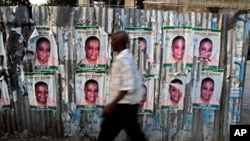Haitian officials say the final results of the country's recent runoff elections will be announced next Monday, instead of this coming Saturday as originally planned.
A government source close to the matter tells the French news agency conditions have not been fulfilled to present the results on Saturday as scheduled. Word of the delay comes as President-elect Michel Martelly prepares to take office May 14, succeeding President Rene Preval.
Mr. Martelly was initially excluded from the disputed first round in November, until international observers reviewed those results and recommended he advance to the second round instead of the ruling party candidate, Jude Celestin. The observers cited fraud and irregularities in the first round of balloting. The second round took place March 20.
Meanwhile, the president-elect says his new government will be all-inclusive and that he plans to make his selections based on qualifications, not political affiliation. In an interview with VOA's Creole service, Mr. Martelly also said he is deciding whom to pick as prime minister to help implement his vision for Haiti. The president-elect says his goals include free tuition for all children nationwide, housing for people living in tent camps following last year's earthquake, and strengthening the agricultural sector so Haiti can become more self-sufficient.
The president-elect was not clear on whether he planned to renew the mandate of the Interim Haiti Reconstruction Commission after its expiration this coming October. Prime Minister Jean-Max Bellerive and former U.S. President Bill Clinton co-chair the commission, which is overseeing assistance to the Caribbean nation following the January 2010 earthquake. The quake left more than 200,000 people dead.
The number of people still living in tent camps as a result of the quake has fallen by more than half to 680,000. A deadly cholera epidemic that started in Haiti last October appears to have stabilized. Millions of people, however, continue to rely on non-governmental organizations to meet their basic needs. Haiti's justice system is dysfunctional, and the prison system is dangerously overcrowded.
Haiti is the Western Hemisphere's poorest country.
Final Haiti Vote Results Delayed




